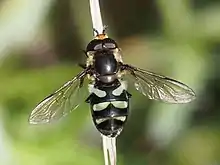Didea alneti
Didea alneti is a Holarctic species of hoverfly.[1][2][3]
| Didea alneti | |
|---|---|
 | |
| Scientific classification | |
| Domain: | Eukaryota |
| Kingdom: | Animalia |
| Phylum: | Arthropoda |
| Class: | Insecta |
| Order: | Diptera |
| Family: | Syrphidae |
| Genus: | Didea |
| Species: | D. alneti |
| Binomial name | |
| Didea alneti Fallén, 1817 | |
Description
For terms see Morphology of Diptera
The wing length is 9 ·75-11·5 mm.
The face mostly yellow. Halteres with at least knob black or dark brown. Male vertex not long, less narrow than in Didea fasciata. Tergite 5 black, rarely with spots. Male tergite 4 with front edge of wedge-shaped bars clearly separated from the front margin of the tergite or just touching front of tergite on median line. [4] [5][6] The male genitalia and the larva are figured by Dusek and Laska (1967) .[7]
Distribution
A Palearctic species with a wide distribution in Europe and East across Russia to the Pacific coast, Mongolia, Japan and Korea. [8][9] in North America from Alaska south to Colorado.[10]
Biology
Habitat forest; conifer forest and taiga, Quercus woodland.[11] Arboreal, descending to visit flowers of white umbellifers, yellow composites, Cirsium, Plantago, Potentilla, Rosa, Rubus idaeus, Salix, Sambucus ebulus, Valeriana officinalis, Viburnum opulus.[12] The flight period is mid May to early September. The larva is arboreal and feeds on aphids associated with Larix, Prunus, Salix and Quercus.
References
- Stubbs, Alan E.; Falk, Steven J (1983). British Hoverflies: An Illustrated Identification Guide (2nd ed.). London: British Entomological and Natural History Society. pp. 253, xvpp. ISBN 1-899935-03-7.
- Ball, S.G.; Morris, R.K.A. (2000). Provisional atlas of British hoverflies (Diptera, Syrphidae). Monks Wood, UK: Biological Record Centre. pp. 167 pages. ISBN 1-870393-54-6.
- Van Veen, M.P. (2004). Hoverflies of Northwest Europe, Identification Keys to the Syrphidae (Hardback). Utrecht: KNNV Publishing. p. 254. ISBN 90-5011-199-8.
- Van der Goot,V.S. (1981) De zweefvliegen van Noordwest - Europa en Europees Rusland, in het bijzonder van de Benelux. KNNV, Uitgave no.32: 275pp. Amsterdam.
- Bei-Bienko, G.Y. & Steyskal, G.C. (1988) Keys to the Insects of the European Part of the USSR, Volume V: Diptera and Siphonaptera, Part I. Amerind Publishing Co., New Delhi. ISBN 81-205-0080-6.
- Coe, R.L. (1953) Diptera: Syrphidae. Handbks.ident.Br.insects, 10(1): 1-98. R.ent.Soc.London. pdf Archived 2018-10-04 at the Wayback Machine
- Dusek, J. & Laska, P. (1967) Versuch zum aufbau eines Naturlichen Systems mitteleuropaischer Arten der Unterfamilie Syrphinae (Diptera). Acta sc.nat.Brno, 1: 349-390.
- Fauna Europaea
- Peck, L.V. (1988) Syrphidae. In: Soos, A. & Papp, L. (eds.) Catalogue of Palaearctic Diptera, 8: 11-230. Akad.Kiado, Budapest.
- Vockeroth, J. R. (1992). The Flower Flies of the Subfamily Syrphinae of Canada, Alaska, and Greenland (Diptera: Syrphidae). Part 18. The Insects and Arachnids of Canada. Ottawa, Ontario: Canadian Government Pub Centre. pp. 1–456.
- Speight, M.C.D. (2011). "Species accounts of European Syrphidae (Diptera)" (PDF). Syrph the Net, the database of European Syrphidae. 65: 285pp.
- de Buck, N. (1990) Bloembezoek en bestuivingsecologie van Zweefvliegen (Diptera, Syrphidae) in het bijzonder voor België. Doc.Trav. IRSNB, no.60, 1-167.